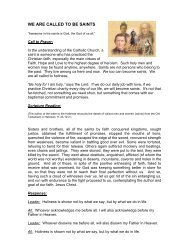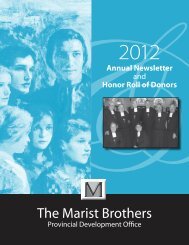A Heart That Knew No Bounds: Text and Reflection Questions
A Heart That Knew No Bounds: Text and Reflection Questions
A Heart That Knew No Bounds: Text and Reflection Questions
Create successful ePaper yourself
Turn your PDF publications into a flip-book with our unique Google optimized e-Paper software.
harsh conditions, the spirit of generosity <strong>and</strong> good humor that marked this first<br />
group of young recruits never failed to shine through. The early brothers did not<br />
have an easy life materially. The deprivation they suffered, however, bound them<br />
one to another <strong>and</strong> caused them to share what little they had. It also kept them<br />
mindful of their need to live close to the circumstances of those they were called<br />
to serve.<br />
In February 1823, Marcellin learned that Brother Jean-Baptiste in another<br />
hamlet had come down with a serious illness. Concerned about his condition, the<br />
young priest set out on the twenty-kilometer journey across rough countryside to<br />
visit him. Brother Stanislaus was at his side.<br />
On their return trip, walking through heavily timbered territory, the two men<br />
were caught in the full fury of one of the region’s snowstorms. Both were young<br />
<strong>and</strong> energetic, but hours of w<strong>and</strong>ering lost on the slopes of Mount Pilat led<br />
eventually to exhaustion. Stanislaus had reached the limits of his stamina. Night<br />
set in; the possibility of death in the snow increased with each passing hour. Both<br />
men turned to Mary for help <strong>and</strong> prayed the Memorare.<br />
Within a short while, they spied lamplight, not too far away in the distance.<br />
A local farmer, Mr. Donnet, had left his house to enter a nearby stable. This<br />
particular evening, though, he had taken an unusual route, especially with the<br />
storm underway. By habit, he entered the stable through a convenient door in the<br />
wall of the house. For reasons that can be explained only by faith, this particular<br />
night he braved wind <strong>and</strong> snow <strong>and</strong> chose a route that took him outdoors with his<br />
lantern. For the rest of his days, Marcellin saw his deliverance <strong>and</strong> that of Brother<br />
Stanislaus—henceforth referred to as the Memorare in the Snow—as an act of<br />
Providence.<br />
The episode that came to be known as the Memorare in the Snow opens<br />
another window on the man <strong>and</strong> his spirituality. What caused Marcellin to set out<br />
on his journey in the first place? Concern for a sick brother. The founder’s great<br />
love for the early brothers was one of his most memorable qualities. Marcellin’s<br />
world might have been small when compared to that of many people today. But<br />
there was nothing small about his heart. He lived a “practical Christianity”; love<br />
always translated itself into concrete action. A brother was sick; the founder set<br />
out to visit him.<br />
Whatever other reasons motivated the timing of his return journey, we can<br />
speculate that his sense of God’s presence <strong>and</strong> confidence in Mary <strong>and</strong> her<br />
protection caused him to undertake the trip where others might hesitate. His<br />
recourse to the Memorare in the face of danger was not the final effort of a dying




